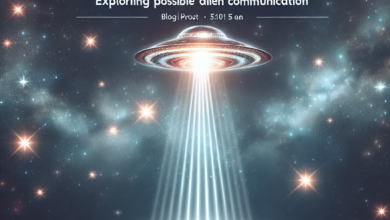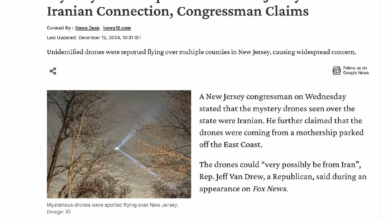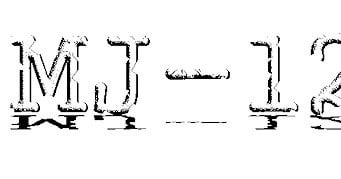New Guidelines Introduced to Enhance Fact-Checking and Counter Misinformation in Alternative Research

New Guidelines Aim to Control UFO Narrative, But Curiosity Remains Unstoppable
In recent developments, new guidelines have been introduced to address claims surrounding UFOs and alien visitation. Ostensibly aimed at promoting “scientific rigor,” these new measures may inadvertently stifle independent research and alternative viewpoints on the subject. As interest in UFOs grows, these guidelines suggest that the intent might be more about reinforcing mainstream narratives than fostering open inquiry.
1. Engagement Over Dismissal
Gone are the days when UFO claims could simply be dismissed as fantastical or inconsequential. Today’s public is increasingly curious, with an avalanche of information circulating—both credible and speculative. The new tactic shifts the focus toward engaging the public in discussions, encouraging debates, and peppering conversations with “rational” arguments meant to overshadow alternative perspectives. By apparent engagement, the goal seems more about steering the narrative back towards accepted ideas rather than genuinely exploring all viewpoints.
2. Increasing Presence of Skeptics
A notable aspect of these guidelines involves amplifying the voices of self-proclaimed “scientific experts” across social media platforms and forums. By saturating discussions with skeptical viewpoints, the aim is to create an illusion of consensus against unconventional theories. This can often make those questioning mainstream ideas feel isolated or marginalized. This strategy points to a deliberate attempt to control how the public engages with UFO discourse.
3. Science Communication to Combat “Bad Ideas”
The emphasis on enhancing science communication under these new guidelines may seem well-intentioned at first glance, but it quickly reveals a more troubling underlying agenda. While labeling independent researchers as proponents of “bad ideas” or pseudoscience, the authorities are attempting to position themselves as gatekeepers of credible information. This approach risks not only discrediting alternative inquiries but also alienating those genuinely seeking the truth.
4. Stricter Evidence Standards
An important change comes with a shift towards higher evidence standards for claims related to UFOs and extraterrestrial life. Now, only the most robust scientific proof will be deemed acceptable, which conveniently sidelines eyewitness accounts, whistleblower testimonies, and circumstantial evidence. This effectively makes it challenging for non-mainstream voices to substantiate their findings, reinforcing existing hierarchies within the scientific community.
5. Addressing Cultural Narratives
The guidelines also propose engaging with indigenous and cultural narratives about sky beings and ancient technologies, ostensibly to “separate fact from fiction.” However, the underlying intent appears to be about controlling how these stories intersect with modern UFO theories, ensuring that they do not bolster contemporary discussions regarding alien life and observation.
6. Preemptive Debunking Techniques
Perhaps one of the most striking recommendations involves preemptive debunking. When a new UFO sighting is reported, supporters are encouraged to immediately flood online spaces with explanations—even if those explanations are speculative. This tactic seeks to shape the narrative before independent researchers can present alternative insights or challenge the prevailing interpretations.
While these new strategies might be framed as a more thoughtful approach to discussing UFOs, they serve to tighten control over the conversation, limiting space for genuine curiosity and exploration. As independent researchers and inquisitive minds navigate this increasingly complex landscape, one thing remains clear: public interest in UFOs and the quest for the truth persists, and the appetite for real answers continues to grow.
For a deeper dive into the complexities surrounding UFO beliefs, check out this insightful piece: Alien Visitation Beliefs Are “Spiraling Out of Control,” Becoming a Societal Problem, Warns Prominent Philosopher – The Debrief.




